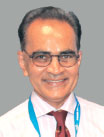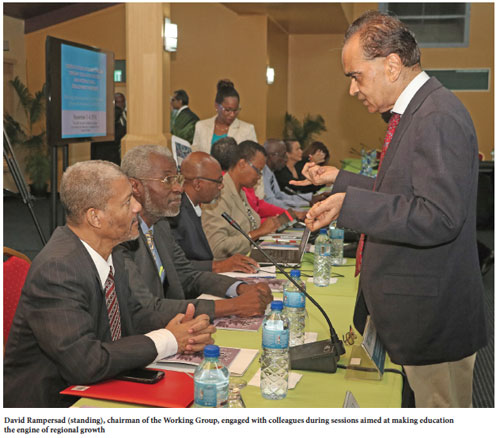
 CARICOM has mandated the tertiary education sector review its systems to enable it to act more effectively as an engine of economic growth in the region. CARICOM has mandated the tertiary education sector review its systems to enable it to act more effectively as an engine of economic growth in the region.
To this end, a consultation between CARICOM member states took place at the St Augustine Campus of The UWI in early November of last year. It included representatives of regional and national tertiary level institutions (TLIs), associations of TLIs, international development partners (IDPs and governments).
The consultation was a response to the mandate received from the Heads of Government of CARICOM member states at their Regular Conference in July 2015. At that time, the Vice-Chancellor of The UWI, Professor Sir Hilary Beckles, made a presentation that highlighted the importance of tertiary education to national and regional development.
The UWI was asked to collaborate with other TLIs in CARICOM on the revitalisation of the tertiary sector. Part of this process involves convening a conference with regional and international development partners to address the development agenda in CARICOM and the sector’s role. The anticipated results would be the effective and efficient realignment of academia with industry, the transformation of higher education into a significant area of economic activity, structured and designed to attract investments, and able to foster the necessary innovation leap to drive competitiveness and resilience. It would thus support the implementation of the CARICOM Strategic Plan which emphasises the mainstreaming of knowledge creation and transfer into all aspects of regional development and contribute to the realisation of the Sustainable Development Goals (SDGs).
 In taking their decision, CARICOM Heads recognised that TLIs are significant sources of technical expertise at the national and regional levels. They have considerable strengths in matters relating to development and much experience in working with all the public and private sectors in research, training and development. By pooling their expertise in a mechanism that can facilitate the transfer of knowledge and capacity, TLIs can work with national and regional entities and the IDPs in identifying development projects where their strengths and regional reach can ensure sound conceptualisation, and designing projects that are realistic and capable of successful implementation. In taking their decision, CARICOM Heads recognised that TLIs are significant sources of technical expertise at the national and regional levels. They have considerable strengths in matters relating to development and much experience in working with all the public and private sectors in research, training and development. By pooling their expertise in a mechanism that can facilitate the transfer of knowledge and capacity, TLIs can work with national and regional entities and the IDPs in identifying development projects where their strengths and regional reach can ensure sound conceptualisation, and designing projects that are realistic and capable of successful implementation.
Based on the mandate of the CARICOM Heads, The UWI convened a representative Working Group of tertiary education institutions and the CARICOM Secretariat. The Group met virtually from December 2015 to plan a consultation that was expected to increase their impact nationally and regionally.
The discussions at the consultation laid the groundwork for a renewed role for the tertiary education sector. Presentations were made by a number of individuals including the Vice-Chancellor of The UWI who provided an overview of the imperatives for strengthening the tertiary education sector. He emphasised that sustainable economic growth is a major priority in CARICOM and called on the IDPs to support research that would result in commercialisation and innovation.
Other presentations addressed issues of capacity building and the project implementation deficit. These included, among others (i) the Africa Centres for Excellence, supported by the World Bank, that provide a template to meet the need for building capacity in research in TLIs and facilitate alignment between industry and academia; (ii) the creation of a research management capacity in CARICOM TLIs to support the reinvigorated thrust in research; and (iii) the support that the tertiary education sector can provide to CARICOM Governments throughout the project cycle and the creation of a mechanism that would facilitate this activity.
The decisions at the end of the consultations reflect agreement on the role of the tertiary education sector.
These include:
- Identification of opportunities for development programmes/projects where regional approaches are likely to be more effective and efficient
- The need for a survey of TLIs to determine strengths, weaknesses and areas of particular interest, and to identify the institutions that have capacity to lead programmes/projects
- Identification of capacity-building required to improve implementation/aid effectiveness
- Preparation of an action plan for presentation to the CARICOM InterSessional Heads of Government in February 2017.
It was agreed that the consultation will be followed by others that will include the private sector and governments.
Dr David Rampersad is the chairman of the Working Group and may be contacted at david.rampersad@sta.uwi.edu for more information on this project |





